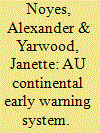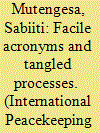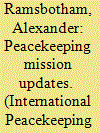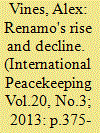|
|
|
Sort Order |
|
|
|
Items / Page
|
|
|
|
|
|
|
| Srl | Item |
| 1 |
ID:
124432


|
|
|
|
|
| Publication |
2013.
|
| Summary/Abstract |
Despite criticism from scholars, the Continental Early Warning System (CEWS) at the African Union (AU) has recently made significant progress in its capacity to monitor, analyse, and provide warning of impending conflict situations in Africa. However, CEWS remains constrained by human resource limitations, inchoate cooperation and information sharing with the early warning efforts of regional organizations, and unsystematic coordination with the various AU organs focusing on peace and security. Additionally, although the early warning-early response gap is narrowing at the AU, early response mechanisms continue to be constrained by limited capacity and issues of political will, as high-level political disagreements and issues of sovereignty militate against effective preventive action. Based on over two-dozen interviews with senior-level CEWS and AU officials, along with other relevant stakeholders, this paper highlights recent operational progress, identifies remaining gaps, and forwards policy options for the AU and international community to build on the gains of CEWS.
|
|
|
|
|
|
|
|
|
|
|
|
|
|
|
|
| 2 |
ID:
124443


|
|
|
|
|
| Publication |
2013.
|
| Summary/Abstract |
Uganda's mass discharge of serving military personnel in the 1990s is touted as one of the most successful cases of donor-supported Disarmament, Demobilization and Reintegration (DDR). However, a closer look at that process reveals a much more complex and less dogmatic approach to managing armed factions than the linearly conceived model often encountered in the 'peacebuilding' literature. Contrary to common assumptions about that country's conflict management, particularly after the ascendance in 1986 of the Museveni government, the newly installed regime deliberately eschewed the policy of 'demobilization' and, in the process, made disarmament unnecessary, primarily by resisting donor pressure to subordinate long-haul pacification to short-term fiscal considerations. Using Uganda as a case study and DDR as a reference point, the article calls for a less perfunctory approach to the interpretation and management of the multifaceted processes of political development in the conflict-plagued pre-industrial countries of the Third World.
|
|
|
|
|
|
|
|
|
|
|
|
|
|
|
|
| 3 |
ID:
124450


|
|
|
|
|
| Publication |
2013.
|
| Summary/Abstract |
All members of the National Commission for Dialogue and Reconciliation, including its President and Vice-Presidents, officially took office in March and April. There was criticism in some quarters that the selection process for membership had not been transparent and that there had been inadequate inclusion of religious, community and traditional leaders.
|
|
|
|
|
|
|
|
|
|
|
|
|
|
|
|
| 4 |
ID:
124446


|
|
|
|
|
| Publication |
2013.
|
| Summary/Abstract |
Mozambique celebrated 20 years of peace in 2012. Renamo was a successful guerrilla force that mostly demobilized and disarmed. It also contested four presidential and parliamentary elections. Renamo became the largest opposition party in Africa until, 2002 but has since been less successful due to exclusion politics by the party of government Frelimo, and because of tactical mistakes by Afonso Dhlakama, Renamo's leader for 33 years. This paper argues that Dhlakama's leadership was critical in bringing an end to the conflict and delivering Renamo's demobilization, but he was unable to tactically change from a guerrilla mentality. Dhlakama's decision to return to rural central Mozambique in late 2012 and the armed violence that followed in 2013 was out of political desperation. Renamo lacks the support or resources to return Mozambique to civil war, and a splinter party, Movimento Democrático de Moçambique, has benefited.
|
|
|
|
|
|
|
|
|
|
|
|
|
|
|
|
|
|
|
|
|